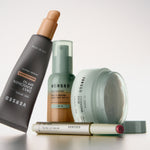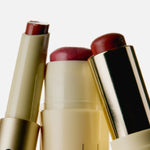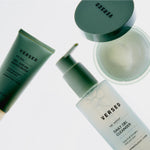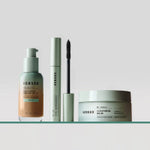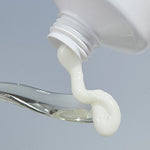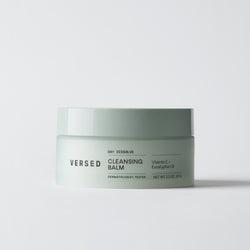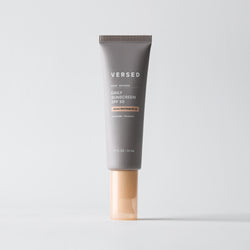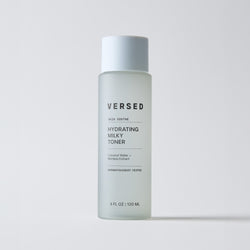When the inquiry ‘If you could ask a dermatologist anything... what would it be?’ appeared in our secret Facebook Group, over 160 responses flooded in with topics ranging from undereye bags to maskne to pore size. While many of these concerns (and more) are frequently covered on the Good Skin Blog, we forwarded some of your more specific skin questions to MD board-certified dermatologist Dr. Nancy Samolitis, co-founder of Facile Dermatology, for her expertise. From the truth about LED light masks to preventing product pilling, read on for the answers to your skin FAQs.
Q: I’m going to see a dermatologist for the first time, what should I ask him or her?
Dr. Nancy: You should ask for a full body skin exam. It is important for everyone to have a baseline skin exam (looking at moles, skin growths, etc) so you can understand your level of risk for skin cancer and what kinds of changes to watch for. You can also ask about treatment for specific skin conditions if you are experiencing something like acne, discoloration, rashes, or hair loss.
Q: What is a viral skincare trend you feel is actually worth practicing?
Dr. Nancy: The most important skincare treatments that are (always) trending include wearing sunscreen everyday (even when you are indoors) most of the time) and using retinol at night. We know from tons of scientific research and years of real life experience that these things really work.
Versed Recommends: Guards Up, Press Restart, The Shortcut
Q: At what age should one start using products for aging?
Dr. Nancy: I started in my early 20s and I think that is the best time. A lot of damage can be done as early as the teen years because sun protection often feels less important to those in that age range. It is much easier to prevent changes in the skin associated with sun damage than to try to reverse them later.
Versed Recommends: Recovery Mode, Zero-G
Q: What can I use on my face to help with eczema, especially around my mouth and under my eyes?
Dr. Nancy: I recommend seeing a board-certified dermatologist to properly diagnose this type of rash because it may not be eczema. Conditions like contact dermatitis, seborrheic dermatitis, perleche, and perioral dermatitis can mimic eczema, but need different treatments. Don't self-diagnose and treat with OTC medications because it may actually make the condition worse.
Q: Why do pimples come back in the same place over and over?
Dr. Nancy: Some hair follicles can be chronically damaged from inflammation causing them to become clogged and inflamed more easily. Early intervention with in-office cortisone injections and effective spot treatments can prevent damage to these follicles.
Versed Recommends: Game Over, Just Breathe, Find Clarity
Dr. Nancy: Yes! If a pimple has a clear pustule that is very close to the surface or if you have a blackhead that is very superficial, these can be gently extracted. I recommend starting with a warm compress for a few minutes and then, using 2 Q-tips, gently press [down] on each side of the pimple. If it does not come out easily, then give it more time. If it does express, clean the area with a salicylic acid toner and apply a pimple patch for at least 24 hours.
Q: How do I get rid of old sun spots from tanning? I quit the habit long ago.
Dr. Nancy: Wearing sunscreen daily and using brightening, repairing, and exfoliating skincare products can help to lighten sun spots from previous tanning. There are many available OTC, but stronger brightening products and in-office treatments like peels, lasers, and microneedling can speed up the process.
Versed Recommends: Doctor’s Visit, Weekend Glow, Guards Up
Q: How can I take care of my skin after a wax or shaving?
Dr. Nancy: Both of these treatments can cause a little inflammation and/or an acne purge. I recommend using a salicylic acid cleanser or toner immediately after and applying an OTC hydrocortisone cream if needed for redness or itching.
Q: Do those at-home LED light masks really work? Is there a difference between the cheaper and pricier ones?
Dr. Nancy: There is evidence that those treatments work, but they can be very time consuming and should not be used as monotherapy. For example, studies looking at treating acne with LED lights showed benefits comparable to using benzoyl peroxide after 3 months. You have to use the treatment regularly and be very patient in order to see results and these should be used in combination with other skincare. There are different colored lights that treat different skin concerns and the less expensive ones are likely to be less powerful.
Q: How does someone suffering from cystic/hormonal acne support skin during their cycle?
Dr. Nancy: Hormonal acne can be difficult to manage without systemic medication, unfortunately. Early intervention with cortisone injections (done in office) can reduce the inflammation almost immediately. I also like anti-inflammatory spot treatments (both OTC and Rx) and pimple patches to prevent touching and picking at the lesion to let it heal naturally. Certain prescription medications can work miracles for hormonal acne.
Versed Recommends: Just Breathe, Find Clarity, Keep the Peace
Q: How can I prevent my products from pilling?
Dr. Nancy: This is usually either caused by certain ingredients in products or using too many products at a time without allowing them to absorb. It may be a trial and error process to figure out which product is the culprit, but in general, when you are layering products, do it slowly and wait a few minutes between layers.
Q: How do you get rid of deep, ice pick scars?
Dr. Nancy: Really deep scars can be incredibly difficult to treat even with lasers and microneedle therapy. The most effective way to remove them is to surgically cut out the scar and create a new scar that is flat and even with the skin surface.
Q: Why is my skin oily in some areas and dry in others?
Dr. Nancy: We genetically have more oil glands in certain parts of the face—the classic T-zone tends to be more oily and pores can be more visible in these areas as well. You can't do much about your genetics, but you can treat the oily areas with different products than you use on the dry areas if needed.
Versed Recommends: Dew Point, Antioxidant Cleanser
Q: Will eating certain foods really help my skin?
Dr. Nancy: It's possible, but this doesn't apply to everyone. Studies looking at diet and acne are a bit inconclusive, but many patients report that dairy and sugar (including processed foods, fast food, etc which usually contain hidden sugar sources) make their acne worse. Avoiding those food products can help your skin and your overall health.
Q: Do blackhead removers/suckers actually do anything?
Dr. Nancy: The medical grade devices like Dermal Infusion and Hydrafacial (and many others) have safe suction settings used by aestheticians to remove clogged pores very quickly and effectively. Ones for home use are typically less strong and can cause more skin trauma if operated by a non-professional.
Acne-specific questions? Read our guide.
